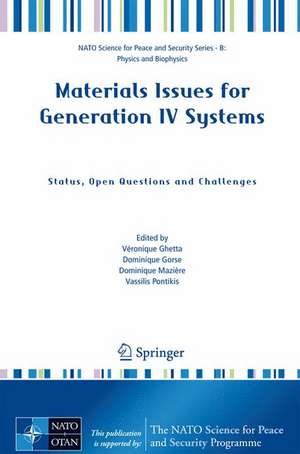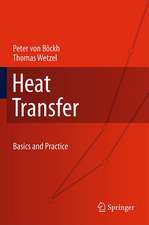Materials Issues for Generation IV Systems: Status, Open Questions and Challenges: NATO Science for Peace and Security Series B: Physics and Biophysics
Editat de Véronique Ghetta, Dominique Gorse, Dominique Mazière, Vassilis Pontikisen Limba Engleză Paperback – 28 apr 2008
The construction and use of such reactors is hindered by several factors, including performance limitations of known structural materials, particularly if the life of the projected systems had to extend over the periods necessary to achieve low costs (at least 60 years).
This book collects lectures and seminars presented at the homonymous NATO ASI held in autumn 2007 at the Institut d’Etudes Scientifiques in Cargèse, France. The adopted approach aims at improving and coordinating basic knowledge in materials science and engineering with specific areas of condensed matter physics, the physics of particle/matter interaction and of radiation damage. It is our belief that this methodology is crucially conditioning the development and the industrial production of new structural materials capable of coping with the requirements of these future reactors.
| Toate formatele și edițiile | Preț | Express |
|---|---|---|
| Paperback (1) | 1830.34 lei 43-57 zile | |
| SPRINGER NETHERLANDS – 28 apr 2008 | 1830.34 lei 43-57 zile | |
| Hardback (1) | 1836.63 lei 43-57 zile | |
| SPRINGER NETHERLANDS – 5 mai 2008 | 1836.63 lei 43-57 zile |
Din seria NATO Science for Peace and Security Series B: Physics and Biophysics
- 18%
 Preț: 955.25 lei
Preț: 955.25 lei - 18%
 Preț: 1222.62 lei
Preț: 1222.62 lei - 24%
 Preț: 1057.17 lei
Preț: 1057.17 lei - 24%
 Preț: 788.31 lei
Preț: 788.31 lei - 18%
 Preț: 1223.74 lei
Preț: 1223.74 lei - 15%
 Preț: 643.99 lei
Preț: 643.99 lei - 18%
 Preț: 1212.36 lei
Preț: 1212.36 lei - 18%
 Preț: 947.85 lei
Preț: 947.85 lei - 18%
 Preț: 950.52 lei
Preț: 950.52 lei - 20%
 Preț: 565.64 lei
Preț: 565.64 lei - 18%
 Preț: 950.66 lei
Preț: 950.66 lei - 24%
 Preț: 1060.06 lei
Preț: 1060.06 lei - 5%
 Preț: 1412.06 lei
Preț: 1412.06 lei - 18%
 Preț: 1226.90 lei
Preț: 1226.90 lei - 18%
 Preț: 945.79 lei
Preț: 945.79 lei - 18%
 Preț: 1221.20 lei
Preț: 1221.20 lei - 24%
 Preț: 789.61 lei
Preț: 789.61 lei - 18%
 Preț: 947.67 lei
Preț: 947.67 lei - 24%
 Preț: 1053.41 lei
Preț: 1053.41 lei - 18%
 Preț: 1834.77 lei
Preț: 1834.77 lei - 18%
 Preț: 943.08 lei
Preț: 943.08 lei - 15%
 Preț: 640.06 lei
Preț: 640.06 lei - 18%
 Preț: 945.30 lei
Preț: 945.30 lei - 18%
 Preț: 1217.62 lei
Preț: 1217.62 lei - 18%
 Preț: 951.14 lei
Preț: 951.14 lei - 18%
 Preț: 1216.02 lei
Preț: 1216.02 lei - 18%
 Preț: 1839.17 lei
Preț: 1839.17 lei - 15%
 Preț: 645.47 lei
Preț: 645.47 lei - 18%
 Preț: 1220.57 lei
Preț: 1220.57 lei - 18%
 Preț: 1217.90 lei
Preț: 1217.90 lei - 18%
 Preț: 1228.96 lei
Preț: 1228.96 lei - 18%
 Preț: 1232.71 lei
Preț: 1232.71 lei - 15%
 Preț: 652.17 lei
Preț: 652.17 lei - 18%
 Preț: 1220.88 lei
Preț: 1220.88 lei - 15%
 Preț: 639.73 lei
Preț: 639.73 lei - 18%
 Preț: 1224.36 lei
Preț: 1224.36 lei - 18%
 Preț: 1828.29 lei
Preț: 1828.29 lei
Preț: 1830.34 lei
Preț vechi: 2232.12 lei
-18% Nou
Puncte Express: 2746
Preț estimativ în valută:
350.28€ • 364.35$ • 289.18£
350.28€ • 364.35$ • 289.18£
Carte tipărită la comandă
Livrare economică 14-28 aprilie
Preluare comenzi: 021 569.72.76
Specificații
ISBN-13: 9781402084232
ISBN-10: 1402084234
Pagini: 604
Ilustrații: XV, 586 p.
Dimensiuni: 155 x 235 x 33 mm
Greutate: 0.84 kg
Ediția:2008
Editura: SPRINGER NETHERLANDS
Colecția Springer
Seria NATO Science for Peace and Security Series B: Physics and Biophysics
Locul publicării:Dordrecht, Netherlands
ISBN-10: 1402084234
Pagini: 604
Ilustrații: XV, 586 p.
Dimensiuni: 155 x 235 x 33 mm
Greutate: 0.84 kg
Ediția:2008
Editura: SPRINGER NETHERLANDS
Colecția Springer
Seria NATO Science for Peace and Security Series B: Physics and Biophysics
Locul publicării:Dordrecht, Netherlands
Public țintă
ResearchCuprins
The Energy Issue and the Possible Contribution of the Various Nuclear Energy Production Scenarios.- Outlook on Generation IV Nuclear Systems and Related Materials R&D Challenges.- Fundamentals of Neutronics: Reactivity Coefficients in Nuclear Reactors.- to Thermodynamics.- Kinetics of Phase Transformation in Multi-Component Systems.- Ab Initio Approaches to Designing Thermodynamic Properties of Materials.- Correlation between Electronic Structure, Magnetism and Physical Properties of Fe-Cr alloys: Ab Initio Modeling.- The Computational Modeling of Alloys: From Ab Initio Calculations and Thermodynamics to Heterogeneous Precipitation.- Numerical Modeling of Radiation Effects in Solids: Principal Features, Limitations and Perspectives.- A Multiscale Approach to Measuring and Modeling Cleavage Fracture Toughness in Structural Steels.- Microstructures and Mechanical Properties of Irradiated Metals and Alloys.- Multiscale Modeling of RPV Embrittlement.- Parametric Dislocation Dynamics and Boundary Element Modeling of Elastic Interaction between Dislocations and Precipitates.- Crystal Plasticity from Dislocation Dynamics.- Radiation-Induced Solute Segregation in Alloys.- Research and Development of Oxide Dispersion Strengthened Ferritic Steels for Sodium Cooled Fast Breeder Reactor Fuels.- Some Aspects of the Structural, Mechanical and Electronic Properties of SiC.- Review: Oxidation of SiC/SiC Composites in Low Oxidising and High Temperature Environment.- Fundamentals of Liquids.- to Interfaces and Diffusion.- Some Aspects of Wetting at High Temperature.- Potentiometric Sensors for High Temperature Liquids.- Influence of Liquid Sodium on Mechanical Properties of Steels, Refractory Alloys and Ceramics.- Radiation Effects in Structural Materials for Fusion Power Plants: the Outcomes of the EU Fusion Program.- to the Physics of Molten Salt Reactors.- Physico-Chemical Properties of Molten Salts.- Combined Effect of Molten Fluoride Salt and Irradiation on Ni-based Alloys.- Specific Features of Particule/Matter Interaction for Accelerator-Driven Sub-Critical Reactors.- Operation of High Power Liquid Metal Spallation Targets: a Challenge for the Structural Materials.
Caracteristici
First document explicitly mixing scientific, engineering, economic and environmental motivations in nuclear energy production Strong statement made on the crucial need for basic science for the construction of high-performance nuclear reactors Tutorial approach accessible to undergraduates and graduates or engineers








